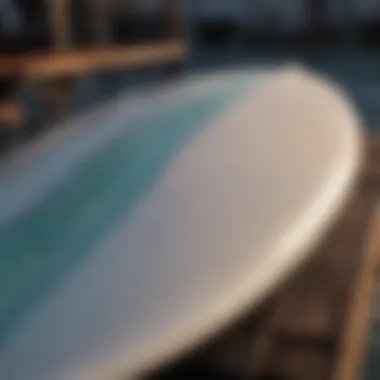Unleashing Innovation: The Versatility of Fiberglass in Surfboard Crafting


Water Activity Overview
Surfing has historically been considered one of the most exhilarating water activities known to humankind, captivating individuals with the raw power of the ocean waves. Sailing, on the other hand, offers a serene and sophisticated experience, harnessing the wind to navigate vast waters. Snorkeling allows enthusiasts to explore the mesmerizing underwater realms, observing marine life up close. Paddleboarding, a relatively newer trend, combines balance and tranquility, providing a unique perspective on water environments. Tips and Techniques For beginners venturing into water sports, mastering basic techniques like paddling and balance is crucial. Advanced enthusiasts seeking an adrenaline rush may delve into maneuvering powerful waves or executing intricate sailing maneuvers. Safety guidelines form the backbone of every water activity, emphasizing the importance of proper gear, situational awareness, and emergency protocols.
r Reviews Surveying the landscape of water sports gear reveals a diverse array of equipment designed to enhance the experience. Surfboards come in various shapes and sizes, catering to different skill levels and wave conditions. Sailboats boast intricate designs optimized for speed and stability, ideal for seasoned sailors. Snorkeling equipment such as masks, fins, and snorkels ensure comfort and efficiency underwater. Paddleboards offer versatility, suitable for both recreational paddling and yoga sessions. Wetsuits, a staple in water sports, provide insulation and protection against the elements.
De
ation Guides Embarking on water sports adventures necessitates a keen awareness of destination choices. Popular spots like Hawaii, Bali, and California beckon water enthusiasts with their world-renowned surfing breaks. Hidden gems off the beaten path, like remote islands and secluded bays, offer intimate settings for undisturbed water activities. Travel tips for water sports trips encompass packing essentials, understanding local regulations, and embracing cultural nuances for a holistic experience.
Introduction
Overview of Fiberglass in Surfing
Fiberglass, a material synonymous with strength and versatility, plays a pivotal role in enhancing the performance and structural integrity of surfboards. Introduced as a lightweight and resilient alternative to traditional materials, fiberglass has redefined the boundaries of surfboard manufacturing, pushing the limits of what surfers can achieve on the waves. By exploring the specific properties of fiberglass and its unique characteristics in the context of surfing, one can truly grasp the profound impact it has had on the sport, revolutionizing board design and functionality.
Significance of Fiberglass in Surfboard Construction
The significance of fiberglass in surfboard construction cannot be overstated due to its unparalleled combination of strength, flexibility, and durability. Fiberglass composites offer surfboard shapers a level of creative freedom and structural integrity that opens up a realm of possibilities in crafting high-performance boards. Its lightweight nature enhances maneuverability, while its exceptional impact resistance ensures longevity and reliability in the face of demanding surf conditions. Understanding the profound impact and intricate processes involved in integrating fiberglass into surfboard construction is key to appreciating its crucial role in shaping the modern surfing experience.


Evolution of Surfboard Materials
Traditional Materials vs. Fiberglass
In comparing traditional materials to fiberglass in surfboard construction, it becomes evident that fiberglass offers unparalleled benefits in terms of strength, flexibility, and lightweight properties. Traditional materials like wood or foam were limited in their performance capabilities, often prone to wear and tear. Fiberglass, with its inherent sturdiness and versatility, elevated the standards of surfboard construction, enabling surfers to push the boundaries of their performance. The transition to fiberglass marked a crucial juncture where surfboards evolved from rudimentary designs to high-performance equipment, showcasing the superiority of fiberglass composites.
Transition to Fiberglass Composites
The transition to fiberglass composites in surfboard manufacturing heralded a new era of innovation and progressive design. Fiberglass composites combined the strengths of traditional materials with the advanced properties of fiberglass, resulting in surfboards that were not only durable but also responsive and agile in the water. This shift represented a departure from convention, as surfboard craftsmen and manufacturers embraced the possibilities afforded by fiberglass composites. The marriage of different materials catalyzed a wave of creativity and experimentation, leading to surfboards that were not just tools for surfing but symbols of artistry and technological advancement.
Properties of Fiberglass
Fiberglass is an exceptional material, central to the innovation in surfboard construction. Understanding its properties is crucial for recognizing its significance in this field. One key aspect is its unmatched strength and flexibility, providing surfboards with resilience and responsiveness. Fiberglass's ability to flex under pressure without breaking makes it ideal for withstanding the demands of rigorous surfing conditions. Moreover, its lightweight nature enhances the surfboard's maneuverability, allowing surfers to navigate waves with ease. Additionally, the impact resistance of fiberglass ensures that surfboards can endure collisions and rough handling, extending their longevity.
Strength and Flexibility
Discussing the strength and flexibility of fiberglass unveils the material's exceptional characteristics. Its robust nature empowers surfboards to withstand the intense forces encountered in the water. The flexibility of fiberglass ensures that the board can bend and adapt to varying wave dynamics, optimizing the surfer's performance. Its ability to spring back into shape after flexing contributes to the board's longevity, allowing surfers to rely on their equipment in diverse conditions.
Lightweight Nature
The lightweight nature of fiberglass is a game-changer in surfboard design. By reducing the overall weight of the board, fiberglass enhances maneuverability and responsiveness, enabling surfers to execute swift movements effortlessly. Its lightweight properties also contribute to reducing fatigue during extended surfing sessions, ensuring a comfortable and enjoyable experience for riders of all levels.
Impact Resistance


Fiberglass's impact resistance is a critical feature that sets it apart in surfboard construction. The material's ability to absorb and dissipate energy from impacts protects the board from damage, ensuring its durability in challenging surfing environments. Whether facing collisions with other surfers or encountering rough waves, fiberglass ensures that the board remains structurally sound, providing surfers with a reliable and long-lasting equipment option.
Application Techniques in Surfboard Construction
In the fascinating realm of surfboard construction, the selection and mastering of application techniques are pivotal. The success of a surfboard's performance is intricately linked to the skillful implementation of these techniques. The process involves a careful orchestration of various steps that dictate the structural integrity and overall functionality of the final product. Application techniques encompass an array of methodologies, from the strategic layering of materials to the precise finishing touches that ensure a polished and aerodynamic board. Surfers, both amateur and professional, acknowledge the significance of these techniques in achieving optimal performance and durability in their boards. It is within the realm of these techniques that creativity meets functionality to deliver surfboards that are not only innovative but also excel in the demanding waters. The fusion of craftsmanship and technology in application techniques underscores the evolution of surfboard construction to meet the ever-changing demands of surfers worldwide.
Layering Process
Within surfboard construction, the layering process stands as a foundational pillar in ensuring structural strength and resilience. It involves a meticulous sequence of adding fiberglass, resin, and core materials in a precise order. Each layer contributes distinct characteristics to the board, such as flexibility and impact resistance. The process demands a keen eye for detail and precision to achieve a uniform and robust distribution of materials. Surfers place immense trust in the layering process, knowing that it is the backbone of their board's performance and longevity. Advanced techniques have enabled surfboard manufacturers to experiment with various material combinations, pushing the boundaries of design and functionality in the surfing world.
Integration with Foam Cores
Integration with foam cores marks a revolutionary shift in surfboard construction techniques. Foam cores, known for their lightweight properties, are seamlessly integrated with fiberglass to create a buoyant yet sturdy board. The synergy between foam cores and fiberglass results in boards that offer enhanced maneuverability without compromising on durability. This integration has allowed surfers to explore new dimensions in wave-riding, unlocking greater agility and control in challenging surf conditions. Surfboard designers continue to refine the integration process, seeking the optimal balance between weight reduction and structural integrity for superior performance.
Finishing and Polishing
The finishing and polishing stage of surfboard construction is the culmination of meticulous craftsmanship and attention to detail. This final phase is not merely about aesthetics but also plays a crucial role in optimizing the board's hydrodynamics. Surfers understand that the smoothness and precision of the board's surface can significantly impact its speed and agility in the water. Expert craftsmen employ various techniques to achieve a flawless finish, ensuring that every curvature enhances the board's performance. From sanding to buffing, every step in the finishing and polishing process is executed with precision to deliver surfboards that exemplify excellence and innovation in wave-riding. This stage showcases the dedication of surfboard manufacturers in providing surfers with cutting-edge equipment that elevates their surfing experience to new heights.
Benefits of Fiberglass Surfboards
Fiberglass surfboards offer a plethora of advantages, making them a preferred choice among surfers. The incorporation of fiberglass in surfboard construction enhances performance, durability, and customization options. This section delves into the significant benefits stemming from the utilization of fiberglass in surfboards.


Enhanced Performance
Fiberglass contributes significantly to the enhanced performance of surfboards. The material's superior strength-to-weight ratio results in boards that are lightweight yet durable. This characteristic allows for improved maneuverability and responsiveness in the water. Surfers can experience heightened speed and agility, making fiberglass surfboards ideal for optimizing performance during rides.
Durability and Longevity
One of the standout features of fiberglass surfboards is their exceptional durability and longevity. Fiberglass, when coupled with other materials in the board's construction, creates a robust structure that can withstand the rigors of frequent use in varying water conditions. Surfboards crafted with fiberglass exhibit a prolonged lifespan compared to those made from traditional materials, providing surfers with a reliable and long-lasting equipment option.
Customization Options
Beyond performance and durability, fiberglass surfboards offer abundant customization possibilities. The material allows for intricate design details, color variations, and tailoring to suit individual preferences. Surfers can personalize their boards to reflect their style and surfing needs, enhancing not only the aesthetic appeal but also the functionality of the surfboard. Fiberglass's versatility in design customization enables surfers to own boards that align perfectly with their riding skills and personal preferences.
Future Trends and Innovations
In the realm of surfboard construction, the bearer of future trends and innovations plays a pivotal role in shaping the landscape of this industry. As technology advances and materials evolve, keeping abreast of the latest developments in fiberglass composites becomes paramount for manufacturers and artisans alike. The beauty of innovation lies not only in pushing boundaries but also in enhancing the performance and durability of surfboards. By embracing cutting-edge techniques and materials, surfboard makers can elevate the surfing experience to new heights. This section delves into the heart of upcoming trends, shedding light on the intricate fusion of tradition and modernity that defines the trajectory of fiberglass in surfboard construction.
Advanced Fiberglass Composites
Advanced fiberglass composites represent the zenith of materials engineering within the surfboard domain. These composites amalgamate high-strength fiberglass with other elements, such as carbon fiber or kevlar, to yield boards that are not only lightweight but also incredibly robust. The integration of advanced composites enhances the overall performance of surfboards, granting riders unparalleled control and responsiveness on the waves. Through meticulous craftsmanship and a deep understanding of material science, artisans can harness the full potential of these composites, translating into surfboards that are veritable works of art in both form and function.
Environmental Sustainability
Amidst the proliferation of technological advancements, a resounding call for environmental sustainability echoes throughout the realm of surfboard construction. Fiberglass, although revolutionary in its performance attributes, needs to tread lightly on the ecological landscape. Manufacturers are increasingly turning towards eco-friendly production methods, utilizing recycled materials and minimizing waste output. The pursuit of sustainability manifests not only in material choices but also in manufacturing processes, aiming to reduce the carbon footprint associated with surfboard production. This section peels back the layers of environmental consciousness within the surfboard industry, spotlighting the intricate dance between innovation and sustainability that shapes the future of fiberglass in surfboard construction.
Conclusion
Summary of Fiberglass Advantages
When contemplating the numerous advantages of fiberglass in surfboard construction, one is confronted with a tapestry of benefits that redefine the surfing experience. The strength and flexibility offered by fiberglass imbue surfboards with a resilience that allows surfers to push the limits of their performance without compromise. Furthermore, the lightweight nature of fiberglass grants surfers the freedom to navigate waves with finesse and agility, enhancing their overall surfing experience. In terms of durability, fiberglass surfboards stand the test of time, resisting wear and tear to ensure prolonged enjoyment for surfers. The customizable options afforded by fiberglass construction empower surfers to tailor their boards to suit their specific preferences, fostering a sense of individuality and personalization in their surfing gear. In essence, the advantages of fiberglass in surfboard construction are not merely functional but transformative, elevating the surfing experience to new heights.















